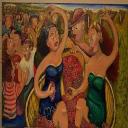Yahoo Answers is shutting down on May 4th, 2021 (Eastern Time) and beginning April 20th, 2021 (Eastern Time) the Yahoo Answers website will be in read-only mode. There will be no changes to other Yahoo properties or services, or your Yahoo account. You can find more information about the Yahoo Answers shutdown and how to download your data on this help page.
Trending News
Please can you advise me what William Blake was trying to get across in this poem, thanks?
The Sick Rose
O rose, thou art sick!
The invisible worm
That flies in the night,
In the howling storm,
Has found out thy bed
Of crimson joy:
And his dark secret love
Does thy life destroy.
William Blake (1757-1827)
Oh Faceless One, and there's me thinking I had identified your romantic side after your sonnet was posted. That was short lived wasn't it?(lol)
15 Answers
- synopsisLv 71 decade agoFavorite Answer
When dealing with Blake it is often useful to remember that he was mad by any normal definition of the term. Blake saw things that were not there, and believed he was channeling messages from various demons and spirits (though he wouldn't have used the term channeling).
What is interesting about Blake is that he was at least partially aware that his visions and auditory hallucinations weren't real; he was certainly sufficiently in control of his insanity to live an almost normal life. (Though nudism in central London was pushing the envelope even for the eighteenth century).
Something which is visibly beautiful (a rose) is carrying some kind of a hidden infection (the worm). Somehow this infection is the result of pleasure (crimson joy), in fact there is some sense in which it is love which is causing the damage (dark secret love).
Imagine yourself in a dream where everything looks wonderful, but you just 'know' it is all somehow totally wrong.
Blake has created a poem which is distilled paranoia.
It probably isn't sensible to talk about what such a poem 'means' (if paranoia would 'mean' something - if you could get a handle on it - it wouldn't be so bad). This poem isn't there to mean, it is there to do something.
The poem is what paranoia feels like. That is what it is about.
- udaya kLv 71 decade ago
To my mind it seems:
Exploitation of the rose is "innocence juxtaposed to experience". It is a transition from innocence to experience. Rose as beautiful, fragranced, innocent flower being infected with the knowledge from the serpent like worm resonate a biblical allusion is evident does simultaneously exist as a conventional symbol of love. Worms therefore are evil, ignorant, earthbound, materialistic, symbolizing death and decay. The infidelity or the lover’s bed as well as the flower where a natural worm creeps after the storm and rain is also picturised. Just as love does not recognize its ailing state the rose also is oblivious of its epitaph and temporal life. The worm of experience that corrupts the innocence of the child hood is evident. And therefore it is invisible, it enters clandestinely into the bed at night more or less depicting the corrupt minds of the century in particular reference to Church which is contrapuntally incorporated through the allusion to the Serpentine Worm, as also the Secrecy attached to Love. This secrecy indeed constitutes part of the infection itself. Both sexual pleasure and shame can be traced in the crimson joy of the rose. Contemporary pervertion and unhealthy society seems to be under attack here. Suggestiveness is within Blake and therefore any number of interpretations are possible.
- Anonymous5 years ago
Blake (who wrote 100 years or more before Robert Frost) called this poem "Auguries of Innocence," I believe. To me, the poem says that if we can recover the innocence of our original selves -- if the cynical, discouraged or guilt-haunted adult can "become like a little child" again -- in Jesus's words -- the world will seem infinite and timeless to us. Recover your original innocence, Blake is saying, and looking at a wildflower will give you a taste of heaven. There's a Bob Dylan song from the 1960s, probably written under the influence of drugs, that has basically the same message. It's called "Gates of Eden." When you can get back inside the "Gates of Eden" and recover your original innocence, Dylan's lyrics suggest, the world's problems -- war, injustice, intolerance, hypocrisy and the like -- fade away, and existence is holy and beautiful. I think that was Blake's vision, too, although Blake's half-gnostic, half-antinomian metaphysics was probably even more complicated that Bob Dylan's. I disagree with those who read this poem as an intimation of mortality, as some kind of elegy for the fleetingness of life -- a la the Book of Ecclesiastes, or a la Frost's comment that "nothing gold can stay." Blake as a thinker doesn't generally deny mortality, but there's no mention of it at all in this verse. Nor is there any mention of Jesus. For better or worse, Blake's vision in this poem is not epicurean or stoic, not focused on the inherent changeability of the universe. It's not focused on salvation through acceptance of Christ, at least Blake isn't talking about that. It's also not fundamentally concerned with the inevitability of death and suffering -- as, say, Frost's poems and the Buddha's teachings are. Blake here is celebrating the mystical sense of bliss that can arise from achieving oneness with the moment. "To hold infinity in a grain of sand, and eternity in an hour."
- Anonymous1 decade ago
Cassie, I saw your question about choosing a book of poetry earlier and suggested a semi-academic title. If you like Blake, why not purchase the selection on him from the Oxford Standard Authors Series, viz. 'Blake: Complete Writings with Variant Readings' by Sir Geoffrey Keynes. It will give you some substantial insight into this poem and the place it occupies in Blake's intricate and inventive mythic system. Just a thought... but it is an excellent book if you like Blake as I do.
- How do you think about the answers? You can sign in to vote the answer.
- 1 decade ago
This is actually quite a sexual poem of Blake. Basically, the rose is a girl. The 'invisible worm' is some man who was 'found out her bed' and therefore slept with her. While the girl is still a beautiful rose, she does not quite understand how 'his dark secret love' has infact 'thy life destroy'. Her life, her image, her reputation has been tarnished, though she doesn't yet know it, by the act of this invisible worm.
Source(s): Studied Blake at university. - Danny RLv 51 decade ago
Now, here’s where our own perspectives can run riot in translation of these images into meaning. What is your guess Cassie? What does he mean by the rose?. Could it be both the natural rose and the symbolic symbol for love? What then, the worm and why invisible in the night.? What could so infect the beauty of either as to taint that which should be pure. Perhaps the rose is England and the worm the onslaught of industrialisation, a theme he covers elsewhere, famously. No, I think its love, that most fragile conveyor of innocence or lust.
- libbyLv 71 decade ago
I can relate to all of the answers here. As the poem is highly symbolic in nature it can have layers of individual interpretation. I always read the poem as a representation of a rape and its deadly aftermath.
- jennyLv 71 decade ago
since rose is the symbol of love and hope, it is easy to see he has lost both, I think it's easy to read between the lines, as did answers, and I assume you knew too.
The poem says alot with few words.
- Anonymous1 decade ago
I suspect infidelity is the hidden theme by affecting Rose's conscience







